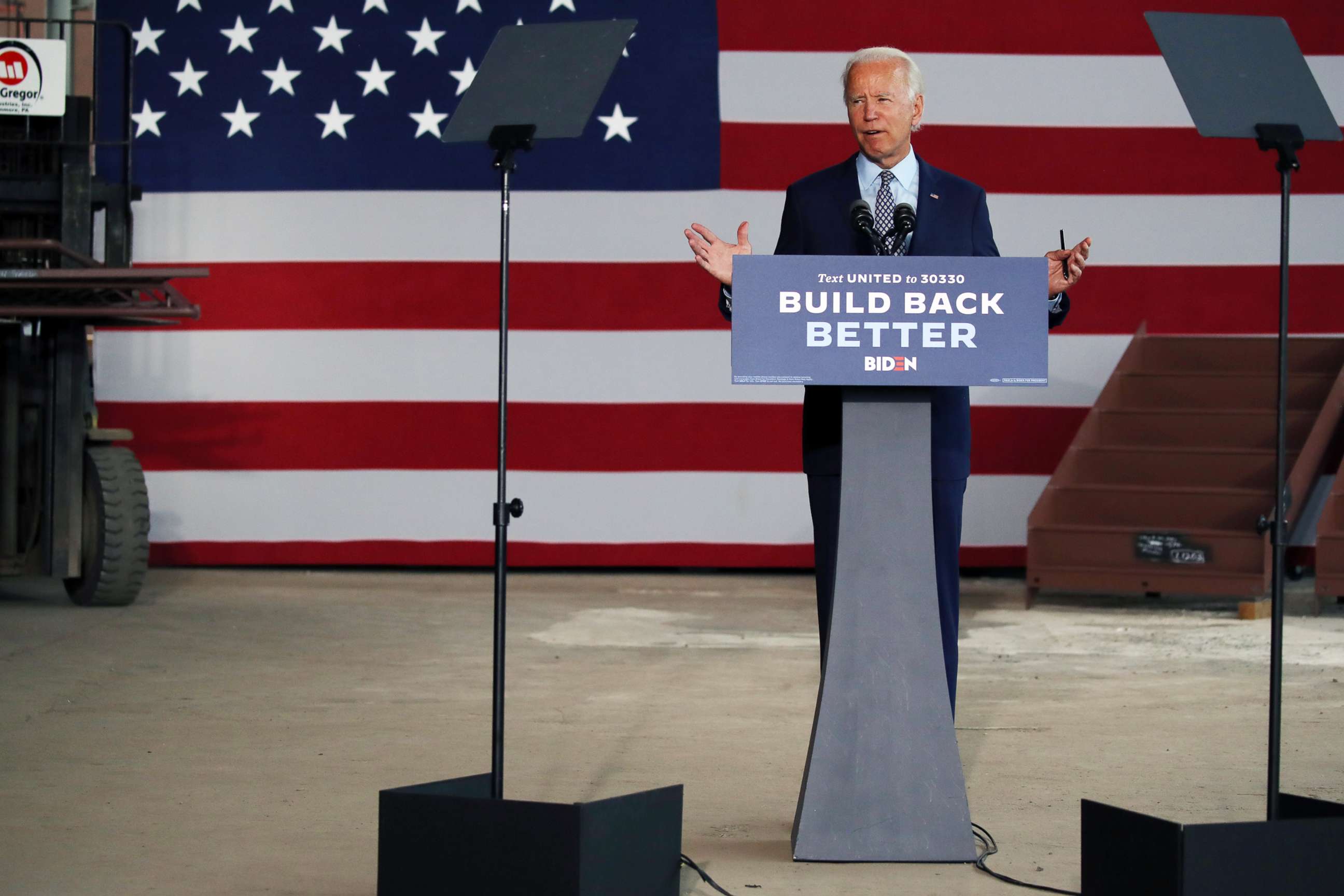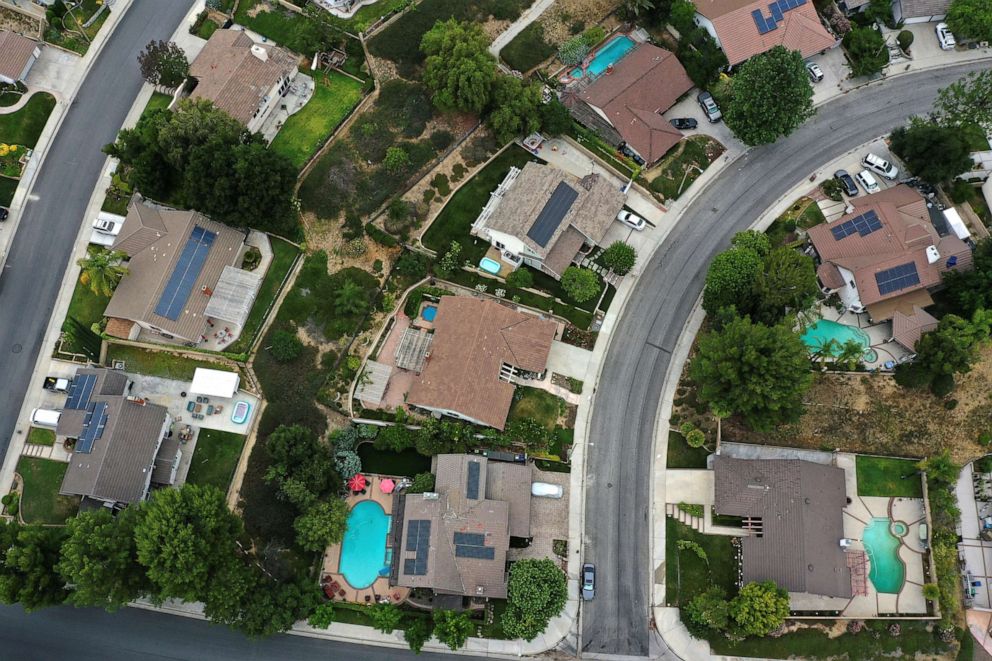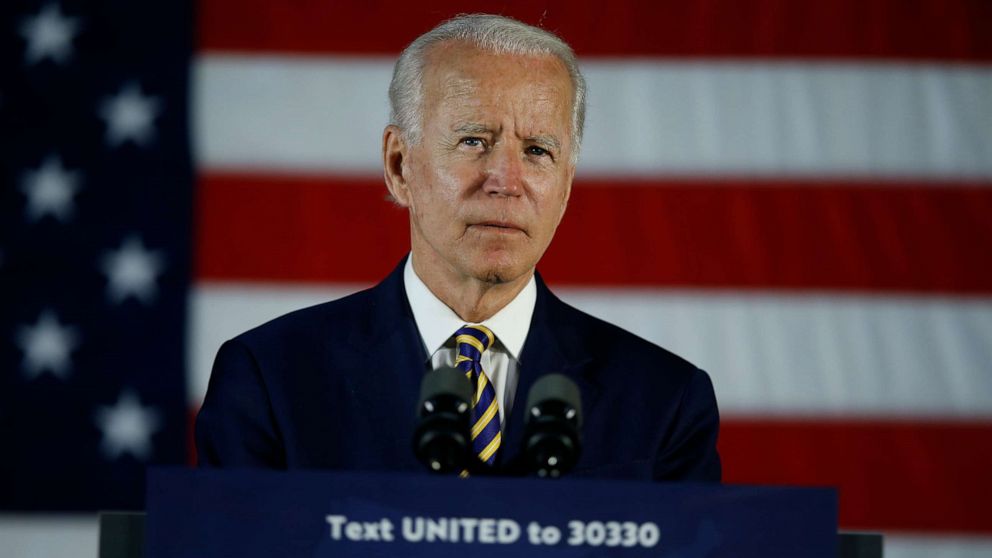Biden unveils ambitious proposal on green energy: 'We're not just going to tinker around the edges'
Advocating for swift and urgent action to address the growing threat of climate change and castigating President Donald Trump over his inaction on the issue, former vice president Joe Biden laid out his vision for a dramatic overhaul of the nation’s energy sector and beefed up investments in sustainable infrastructure in a speech Tuesday afternoon from his hometown of Wilmington, Delaware.
"If I have the honor of being elected president, we're not just going to tinker around the edges. We're going to make historic investments that will seize the opportunity and meet this moment in history," Biden said, echoing the language used by some of his more progressive former rivals for the Democratic presidential nomination.
Earlier Tuesday, Biden unveiled a sweeping new proposal that called for the United States to achieve a carbon-free power sector by 2035 and make a $2 trillion investment over his first four years in office in green energy and infrastructure to combat the threat of climate change.
"When Donald Trump thinks about climate change, the only word he can muster is hoax. When I think about climate change, the word I think of is jobs," Biden mused on Tuesday, referencing a 2014 tweet from his GOP rival.
The new timeline and spending represent a significantly more aggressive approach on the issue for Biden, who faced calls during the Democratic primary from the progressive wing of the party to make the fight against climate change a more urgent priority.

On Tuesday, the presumptive Democratic nominee sought to cast his new proposal as an ambitious but realistic set of policies that address a challenge many Democrats and young people rank consistently and increasingly as a top issue.
"Look, these aren't pie in the sky dreams. These are actionable policies that we can get to work on right away," Biden argued, casting the alternative choice of denying the science behind climate change and resisting aggressive action as "un-American."
The campaign described the proposal, which would move the nation rapidly toward a quick reduction of its reliance on fossil fuels, as a jobs and infrastructure plan, building upon and incorporating his initial climate policy, by "scaling up and accelerating our investments to meet the moment we are in: an economic crisis," according to one campaign adviser.
During his remarks, Biden delivered a cutting criticism of Trump for his failure to get the coronavirus under control, which according to Biden would allow for the economy to reopen.
"Mr. President, 'open everything now' isn't a strategy for success. It’s barely a slogan. Quit pushing the false choice between protecting our health and protecting our economy," Biden said.
"Mr. President, please listen to your public health experts instead of denigrating them. Do your job, Mr. President, because if we can't deal with a public health crisis we can't deal with the economic crisis or deal with almost 18 million Americans who are out of work and the incredible pain inflicted on small businesses and communities of color," the former vice president continued.
In a fact sheet outlining the new plan, which is the second pillar of his "Build Back Better" economic proposal, Biden’s campaign asserted that if the steps the candidate is proposing are taken, they will put the United States on a "irreversible path to achieve net-zero emissions, economy-wide, by no later than 2050."
"Biden has from the outset, rejected the idea that we have to choose between good jobs and a clean energy future. He laid out a vision on this last year for building a clean energy future, and today he's putting in place some of the concrete plans to create these jobs. Again, these are good paying union jobs," a Biden campaign adviser told reporters on a conference call outlining the plan Tuesday morning.
The more aggressive plan also comes roughly a week after a task force established by Biden and former primary rival Sen. Bernie Sanders recommended that the presumptive Democratic nominee move to "elimin[ate] carbon pollution from power plants by 2035 through technology-neutral standards for clean energy and energy efficiency," a proposal that has now officially made its way into the former vice president’s platform.
However, a senior campaign adviser stressed Tuesday that the new plan did not solely rely on the recommendations from the task force and is instead the result of a year-long process to develop a plan that creates jobs and moves the nation toward a more sustainable energy sector, consulting with a combination of elected officials, policy experts, scientists and private sector businesses.
"I would...not peg this specifically to the task force recommendations, but a well over a year's long effort to get this right," the adviser said, slamming the Trump administration’s lack of focus on the issue of climate change.
"This week, we're really taking on infrastructure, I mean this is something that [Trump] has tried to own and, frankly abjectly failed. You know the plan that we're putting forward today will modernize America's infrastructure from end to end, and make it sustainable for the future. So, this is an actual infrastructure week," another adviser argued, taking aim at the Trump administration’s frequent celebrations of "infrastructure week."
Biden also took aim at Trump for his perennial promise to produce an infrastructure plan for the country, arguing that talk about such a plan serves a distraction for the administration.
"It seems like every few weeks, when he needs a distraction from the latest charges of corruption in his staff or the conviction of high-ranking members of his administration and political apparatus, the White House announces: ‘It’s infrastructure week.’ How many times have you heard him say that? But he's never delivered. He’s never really even tried," Biden said.
Prior to the release of the plan and Biden’s remarks, President Trump’s re-election campaign focused on the price tag of the proposal and argued that it would negatively affect the pocketbooks of low-income Americans.
"You would see higher energy costs, and you would see who gets hit the hardest, which is low-income families. This literally would hit low-income families the hardest because higher energy crises have a much higher burden on low-income families," House Minority Whip Steve Scalise, R-La., told reporters on a conference call Tuesday.
In contrast to the criticism from Trump allies within the GOP, the plan garnered praise from the United Autoworkers of America (UAW), which applauded its specific focus on the auto industry and emphasis on generating union jobs.
"By focusing on investments in new technology, increasing demand for American-made and sourced clean vehicles; investing in our plants and our auto manufacturing facilities and creating 1 million new jobs, this all-American plan will ensure that the industry will thrive for decades to come with good paying union jobs," the union said in a statement.
Along with the green economy plan, the campaign also released a plan specifically focused on environmental justice and combating the disproportional impacts of climate change on communities of color.

The campaign committed to targeting 40% of the benefits of its "clean energy revolution" to disadvantaged communities and will place a focus on addressing the connection between the impacts of climate change and public health, drawing on points from Biden’s plan to combat coronavirus and prepare for future global health threats.
The campaign will also focus on collecting data to inform decisions, creating a ‘Climate and Economic Justice Screening Tool’ that will identify communities impacted by the effects of climate change and publish that information in annual maps identifying the communities.
As part of the plan, Biden’s campaign is committing to establish an Environmental and Climate Justice Division within the Department of Justice, and overhaul the EPA External Civil Rights Compliance Office, as part of a path to overhaul the government’s current environmental justice policy, which dates back to 1994.
Biden’s previously-released plan on climate change called for a "federal investment of $1.7 trillion over the next ten years, leveraging additional private sector and state and local investments to total to more than $5 trillion," and aimed to achieve "a 100% clean energy economy and net-zero emissions no later than 2050."
Biden’s initial $1.7 trillion price tag for the federal funds would be paid for by "reversing the excesses of the Trump tax cuts for corporations, reducing incentives for tax havens, evasion, and outsourcing, ensuring corporations pay their fair share, closing other loopholes in our tax code that reward work not wealth, and ending subsidies for fossil fuels," according to the campaign.
The $2 trillion price tag over four years, the campaign argued, is "what the science demands to address the climate crisis," but when asked specifically about how it intends to pay for the hefty price tag, the campaign declined to provide specifics, saying the full payment plan would be revealed when the full "Build Back Better" plan was announced in the coming weeks.
"It will be a combination of paid-for spending through tax increases on corporations back to the 28% rate and asking the wealthiest Americans to pay their fair share, and some amount of stimulus spending, and we'll have more to say on what that looks like in the weeks ahead," an adviser said.
Biden’s plan released Tuesday also calls for the creation of a "Civilian Climate Corps" to develop scientific solutions to spur a more sustainable economy, an idea that was originally proposed by another one of the Democrat’s former primary rivals, Washington Gov. Jay Inslee.
Inslee, who made climate change the foundational issue of his presidential campaign, released a statement on Tuesday praising Biden’s new plan.
"The next president must lead a national mobilization to defeat climate change. Joe Biden’s plan shows that he’s serious about defeating climate change, and has a roadmap to become the Climate President that America needs," Inslee, whose team provided input to Biden’s campaign to craft its energy policy, wrote.
At a virtual fundraiser on Monday evening, Biden spoke specifically about the sense of urgency he plans to bring on the issue of combating climate change if he unseats Trump in November.
"2050 is a million years from now in most people. My plan is focused on taking action. Now," Biden said. "God willing I win and even if I serve eight years, I want to make sure we put down such a marker that it’s impossible for the next president to turn it around."
ABC News' Will Steakin contributed to this report.71766318previously




